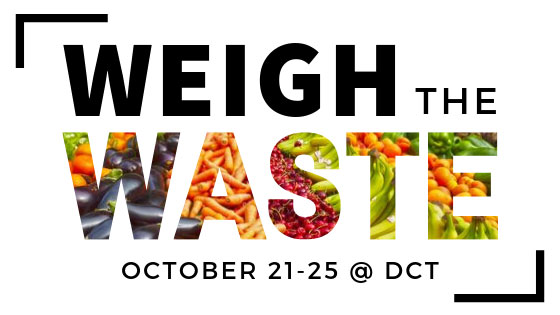Reducing Food Waste, One Plate at a Time
The Office of Sustainability Initiatives (OSI) launched a food waste awareness campaign, during which they collected 633.8 lbs. of edible plate waste in the Dobbs Common Table (DCT) an all-you-care-to-eat dining facility on Emory University’s campus. MDP 2015 alumna Taylor Spicer and first year MDP student Jamie Lutz reflect on the impact this initiative can have on the Emory community.
“This is one attempt to have this conversation about wasted food on both sides- with the operations team and with the guests that are eating at this facility,” reflects Taylor Spicer, Programs Manager of the Office of Sustainability Initiatives (OSI). For several years now, OSI has collaborated with Bon Appétit, Emory’s food service provider, to conduct an audit of wasted food to generate data on the amount of and reasons for food waste in dining facilities. For one week, lunch guests at the DCT scraped plate waste into three containers labeled “edible waste”, “inedible waste”, and “liquid waste.” Each of the containers was measured for a cumulative weight that could serve 507 meals (an average meal is 1.25 lbs)! Given that Atlanta is an area that struggles with food security, this is a huge problem.

“Part of the purpose of this awareness campaign is to force people to confront the consequences of our actions and inactions. In this case, our choices are creating a lot of wasted food, and consequently wasting all of the energy, money, and labor that went into producing that food,” says Jamie Lutz, Sustainable Food Intern for OSI. During the process, students were surveyed as to why they left food on their plates. These reasons included options like “didn’t like it” and “took too much,” which were the two largest response categories.
The Weigh the Waste campaign has already documented a reduction in wasted food over the past few years largely as a result of operational changes at DCT. While the amount of wasted food is still high, the weight this year is a significant drop from the amount of food measured during last spring’s initiative, despite the fact that almost double the amount of guests were served during the duration of this year’s campaign compared to last year’s guest counts. This improvement could be related to operational changes made by Emory Dining in the new dining facilities, which included removing trays and using smaller plate sizes. These decisions were intentionally made to help reduce individual food waste.
The OSI staff will discuss the campaign’s results with Bon Appétit staff in order to find more ways to eliminate individual food waste in dining facilities. Additionally, OSI plans to follow up with the student population through a survey and visual displays in the dining facility informing the students about the impacts of wasting food and ways everyone can reduce their individual waste. “Within our campus community, we can find small, actionable ways that add up to larger
Curriculum
The Emory MDP curriculum combines natural, social, health sciences and management.
FIELD PRACTICUM
The Field Practicum is a core component of the Emory MDP curriculum.

